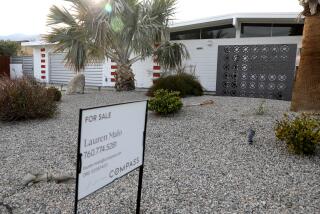Smart Moves : Good ‘Listers’ Have a Marketing Strategy
- Share via
They’re known in the real estate industry as “listers.” These are agents whose big, smiling portraits look out at you from the newspaper ads. Underneath their names you see huge dollar amounts of property sold.
They’re successful. But are they always the best pick to list your home? Not necessarily, real estate experts say.
“There are a few agents who will list your house and then just let it sit. They’re good at talking their way into listings. But they’ll do little for you in the way of actively marketing your home,” says Robert Irwin, author of “Tips and Traps When Buying a Home,” a McGraw-Hill paperback.
Those who list many homes and then sit passively on the sidelines awaiting a sale are often playing a numbers game. They concentrate their salesmanship on amassing a large volume of listings on the assumption that a fair proportion of them will sell and yield them commissions, Irwin says.
The problem is that not all the listings maintained by the passive agent will enjoy the attention they need. Like the nine children of a busy mother, the odds have it that some will grow up and prosper but that others will flounder for lack of nurturing.
To be sure, not every listing specialist will neglect your property, points out Monte Helme, a vice president with Century 21 International, the realty chain.
“There are good ones and there are bad ones,” he says.
All listing specialists seek to build large portfolios of property--perhaps 50 to 70 listings compared to the 20 or 30 carried by the average real estate agent. And the good ones are able to manage their heavy loads.
But as a home-seller, what you want to avoid is the listing agent who counts on the law of averages--not his marketing skills--to earn a livelihood. In this era when buyers’ markets prevail, you need an active marketing plan to sell your property at a good price, realty experts point out.
“Problems arise when listing agents don’t advertise homes, don’t hold special open houses for brokers and don’t engage in direct marketing with other agents,” says Peter G. Miller, the author of several books on real estate.
How can you distinguish an effective listing agent from one who is only playing a numbers game? The experts offer these suggestions:
--Don’t automatically reject an agent who is a listing specialist.
The common element of all listing specialists is that they cater to sellers, not buyers. It’s rare for listers to show property to prospects, but the good ones still provide good service to the owners of properties they list.
“There are a great many very successful agents, all around the country, for whom 90% or 95% of their business involves listings,” says Helme of Century 21.
It’s no sin for an agent to make his living specializing in the listing of property, so long as he actively represents those whose listings he holds, Helme says.
--Take a serious approach to the selection of an agent.
“People used to hire someone who was a friend or a co-worker. But nowadays, owners see the sale of their property more as a business transaction. They’re looking for someone who is results-oriented,” says Miller, the real estate author.
When you’re considering engaging an agent, why not call a few of his previous clients to ask them what marketing measures the agent took on their behalf and whether they were satisfied? It’s not unreasonable to ask for references.
“History is prologue, and so is experience. You have to see what the agent has done in the past,” Miller recommends.
--Ask a prospective agent to commit to specific marketing plans when you engage him.
Once, when sellers’ markets were the rule rather than the exception, an agent could take a relatively relaxed approach to marketing a home. Often it would be enough to provide generalized advertising, designed to appeal to the masses, to sell a home.
But in the ‘90s, with more for-sale houses than interested buyers, agents must be more clever. For any given property, a strategy should be developed to target a particular group of buyers.
For instance, an agent seeking to sell a one-level ranch house might target elderly buyers who prefer a home without steps. In this case, the agent’s advertising, brochures and other marketing devices--such as open houses for other agents--might be geared for the senior market.
“To sell a property in today’s world is much more complex than it was five or 10 years ago,” Miller says.
By asking your agent to commit to a detailed marketing plan at the beginning, you’ll have a way to gauge his performance during the listing period. Then if he proves to be a passive “lister,” Miller suggests you replace him when your listing agreement expires.
“Sellers have a clear economic risk if their agent is not a good agent,” he says. “If your house doesn’t sell, who is going to pay the mortgage? Who is going to pay the taxes? It won’t be the agent.”
Distributed by Universal Press Syndicate.
More to Read
Inside the business of entertainment
The Wide Shot brings you news, analysis and insights on everything from streaming wars to production — and what it all means for the future.
You may occasionally receive promotional content from the Los Angeles Times.










